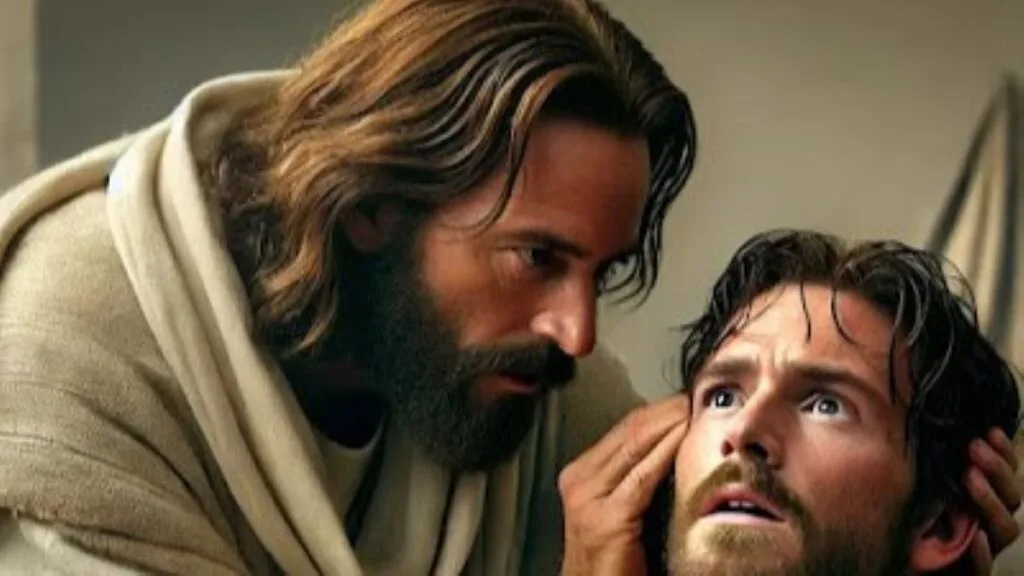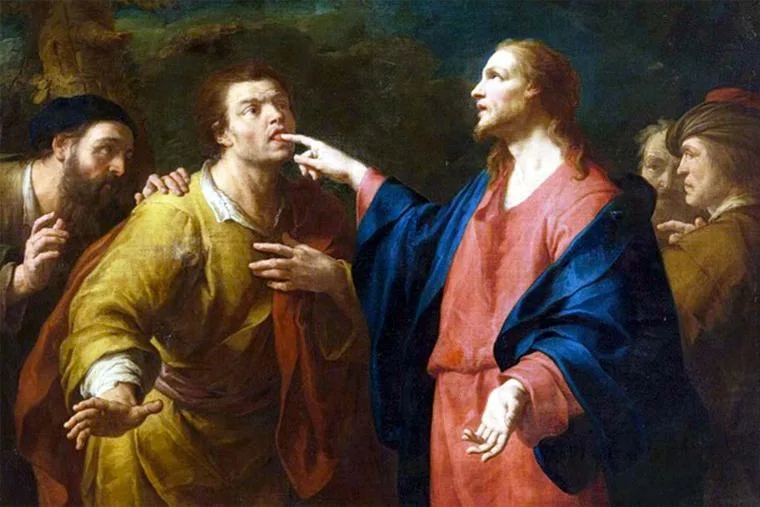POPE FRANCIS’ REFLECTION 23rd SUNDAY IN ORDINARY TIME B

The first words the Lord addresses to us today are, “Be strong, do not fear!” (Is 35:4). In this way, the prophet Isaiah addresses all those who have lost heart. He likewise encourages his people and, even amid difficulties and suffering, invites them to raise their eyes to a horizon of hope and to a future where God is coming to save us. For the Lord will indeed come, and on that day, “the eyes of the blind shall be opened, and the ears of the deaf unstopped” (Is 35:5).
This prophecy is fulfilled in Jesus. In Saint Mark’s account, two things in particular are emphasized: the distance of the deaf man and the nearness of Jesus.
The distance of the deaf man. We see him in a geographical area that we would call, in today’s language, the “periphery”. The territory of the Decapolis lies beyond the Jordan, far from the religious centre of Jerusalem. What is more, this deaf man also experiences another kind of distance: he is far from God and from others because he cannot communicate, he is deaf and thus unable to hear, and he is also mute and so cannot speak. He is cut off from the world, isolated, a prisoner of his deaf and mute condition, so he cannot reach others or communicate with them.
We can also interpret the man’s situation in another sense, for we too can become cut off from communion and friendship with God and with our brothers and sisters when, instead of our ears and tongue, our hearts become blocked. Indeed, there is a kind of inner deafness and muteness of heart that occurs whenever we close in on ourselves, or shut ourselves off from God and others through selfishness, indifference, fear of taking risks or putting ourselves on the line, resentment, hatred, and the list could go on. All of this distances us from God, from our brothers and sisters, from ourselves and from the joy of living.
Brothers and sisters, God responds to such distance in the complete opposite way, with the nearness of Jesus. Through his Son, God wishes to show first of all that he is near and compassionate, that he cares for us and overcomes any distance. In fact, in the Gospel passage we see Jesus going to territories on the peripheries, leaving Judea in order to meet the pagans (cf. Mk7:31).
Through his nearness, Jesus heals human muteness and deafness. Indeed, whenever we feel distant, or we choose to keep ourselves at a distance from God, from our brothers and sisters or from those who are different from us, we close ourselves off, barricading ourselves from the outside. We end up, then, revolving only around our own ego, deaf to the word of God and to the cry of our neighbour, and therefore unable to speak to God or our neighbour.
And you, brothers and sisters, who live in this land so far away, perhaps you may imagine that you are separated from the Lord and from one another. This is not true, no: you are united in the Holy Spirit and in the Lord! And the Lord says to each one of you, “be opened”! The most important thing is to open ourselves to God and our brothers and sisters, and to open ourselves to the Gospel, making it the compass of our lives.
Today, the Lord also says to you, “Courage, people of Papua New Guinea, do not be afraid! Open yourselves! Open yourselves to the joy of the Gospel; open yourselves to encounter God; open yourselves to the love of your brothers and sisters”. May none of us remain deaf or mute before this invitation. Moreover, may Blessed John Mazzucconi accompany you on this journey, for amid much difficulty and hostility he brought Christ into your midst, so that no one would remain deaf before the joyful message of salvation, and that all might loosen their tongues to sing of God’s love. May this indeed be so for you today!
Source: https://press.vatican.va/content/salastampa/en/bollettino/pubblico/2024/09/08/240908b.html
Emphasis mine.

ANGELUS
Saint Peter’s Square
Sunday, 5 September 2021
____________________
Dear brothers and sisters, buongiorno!
The Gospel for today’s liturgy presents Jesus who heals a deaf man with a speech impediment. What is striking about this story is how the Lord performs this prodigious sign. He took the deaf man aside, put his finger into the man’s ears, and touched his tongue with saliva. Then he looked up to heaven, groaned, and said to him: “Ephphatha”, that is, “Be opened!” (cf Mk 7:33-34). In other healings, for infirmities as serious as paralysis or leprosy, Jesus did not do as many things. So why does he do all of this, even though they had only asked him to lay his hands on the sick man (cf. v.32)? Maybe it was because that person’s condition had a particularly symbolic value. The condition of deafness is also a symbol that can say something to all of us. What is this about? Deafness. That man was unable to speak because he could not hear. To heal the cause of his infirmity, Jesus, in fact, placed his fingers first of all in the man’s ears, then his mouth, but his ears first.
We all have ears, but very often we are not able to hear. Why is this? Brothers and sisters, there is an interior deafness that we can ask Jesus to touch and heal today. It is interior deafness, which is worse than physical deafness, because it is the deafness of the heart. Taken up with haste, by so many things to say and do, we do not find time to stop and listen to those who speak to us. We run the risk of becoming impervious to everything and not making room for those who need to be heard. I am thinking about children, young people, the elderly, the many who do not really need words and sermons, but to be heard. Let us ask ourselves: how is my capacity to listen going? Do I let myself be touched by people’s lives? Do I know how to spend time with those who are close to me in order to listen? This regards all of us, but in a special way also priests. The priest must listen to people, not in a rushed way, but listen and see how he can help, but after having listened. And all of us: first listen, then respond. Think about family life: how many times do we talk without listening first, repeating the same things, always the same things! Incapable of listening, we always say the same things, or we do not let the other person finish talking, expressing themselves, and we interrupt them. Starting a dialogue often happens not through words but silence, by not insisting, by patiently beginning anew to listen to others, hearing about their struggles and what they carry inside. The healing of the heart begins with listening. Listening. This is what restores the heart. “But Father, there are boring people who say the same things over and over again…” Listen to them. And then, when they have finished talking, you may speak, but listen to everything.
And the same is true with the Lord. It is good to inundate Him with requests, but it is better that we first of all listen to him. Jesus requests this. In the Gospel, when they ask him what is the first commandment, he answered: “Hear, O Israel”. Then he added the first commandment: “You shall love the Lord your God with all your heart…(and) your neighbor as yourself” (Mk 12:28-31). But first of all, “Hear, O Israel”. Do we remember to listen to the Lord? We are Christians, but sometimes with the thousands of words we hear every day, we do not find a moment to let a few words of the Gospel resound in us. Jesus is the Word: if we do not stop to listen to Him, He moves on. Saint Augustine said, “I fear that Jesus will pass by me unnoticed.” And the fear was to let Him pass by without hearing Him. But if we dedicate time to the Gospel, we will find the secret for our spiritual health. This is the medicine: every day a little silence and listening, fewer useless words and more of the Word of God. Always with the Gospel in your pocket that can help greatly. Today, as on the day of our Baptism, we hear the words of Jesus addressed to us: “Ephphatha, be opened!” Open your ears. Jesus, I want to open myself to your Word; Jesus, open myself to listening to you; Jesus, heal my heart from being closed, heal my heart from haste, heal my heart from impatience.
May the Blessed Virgin Mary, who was open to hearing the Word which became flesh in her, help us every day to listen to her Son in the Gospel and to our brothers and sisters with a docile heart, with a patient heart, and with an attentive heart.

ANGELUS
Saint Peter’s Square
Sunday, 9 September 2018
Dear Brothers and Sisters, Good morning!
This Sunday’s Gospel passage (cf. Mk 7:31-37) refers to the episode of the miraculous healing by Jesus of a man who was deaf and had a speech impediment. They brought to him a deaf and dumb man, beseeching Him to lay a hand upon him. Instead, He performed two different gestures upon him: first of all He took the man aside, far from the crowd. On this occasion, as on others, Jesus always acts with discretion. He does not want to impress people; He is not seeking popularity or success, but wishes only to do good to people. With this attitude, He teaches us that good is to be done without clamour, without ostentation, without “blowing one’s trumpet”. It should be done quietly.
When they had drawn aside, Jesus put his fingers in the deaf man’s ears and touched his tongue with saliva. This gesture refers to the Incarnation. The Son of God is a man inserted into human reality: he became man; therefore he can understand another man’s distressing condition and intervene with a gesture which concerned his own humanity. At the same time, Jesus wanted to make it understood that the miracle occurred because of his union with the Father: for this reason, he looked up to heaven. He then sighed and said the decisive word: “Ephphatha”, which means “Be opened”. And immediately the man was healed: his ears were opened, his tongue was released. For him the healing was an “opening” to others and to the world.
This Gospel narrative emphasizes the need for a twofold healing. First and foremost the healing from illness and from physical suffering, in order to restore bodily health; even though this aim is not completely achievable on the earthly plane, despite the many efforts of science and medicine. But there is a second, perhaps more difficult healing, and it is healing from fear. Healing from the fear that impels us to marginalize the sick, to marginalize the suffering, the disabled. And there are many ways to marginalize, even by showing pseudo compassion or by ignoring the problem; we remain deaf and dumb to the suffering of people marked by illness, anguish and difficulty. Too often the sick and the suffering become a problem, while they should be an occasion to show a society’s concern and solidarity with regard to the weakest.
Jesus revealed to us the secret of a miracle that we too can imitate, becoming protagonists of “Ephphatha”, of that phrase ‘be opened’ with which He gave speech and hearing back to the deaf and dumb man. It means opening ourselves to the needs of our brothers and sisters who are suffering and in need of help, by shunning selfishness and hardheartedness. It is precisely the heart, that is the deep core of the person, that Jesus came to “open”, to free, in order to make us capable of fully living the relationship with God and with others. He became man so that man, rendered internally deaf and mute by sin, may hear the voice of God, the voice of Love that speaks to his heart, and thereby in turn, may learn to speak the language of love, transforming it into gestures of generosity and self-giving.
May Mary, the One who completely “opened” herself to the Lord’s love, enable us to experience each day, in faith, the miracle of “Ephphatha”, in order to live in communion with God and with our brothers and sisters.
Source: https://www.vatican.va/content/francesco/en/angelus/2018/documents/papa-francesco_angelus_20180909.html

ANGELUS
Saint Peter’s Square
Sunday, 6 September 2015
Dear Brothers and Sisters, Good morning!
The Gospel today (Mk 7:31-37) recounts Jesus’ healing of a man who was deaf and had a speech impediment, an incredible event that shows how Jesus reestablishes the full communication of man with God and with other people. The miracle is set in the region of the Decapolis, that is, in a completely pagan territory; thus, this deaf man who is brought before Jesus becomes the symbol of an unbeliever who completes a journey to faith. In effect, his deafness expresses the inability to hear and to understand, not just the words of man, but also the Word of God. And St Paul reminds us that “faith comes from what is heard” (Rom 10:17).
The first thing that Jesus does is take this man far from the crowd: He doesn’t want to publicize this deed he intends to carry out, but he also doesn’t want his word to be lost in the din of voices and the chatter of those around. The Word of God that Christ brings us needs silence to be welcomed as the Word that heals, that reconciles and reestablishes communication.
Then we are told about two gestures Jesus makes. He touches the ears and the tongue of the deaf man. To reestablish a relationship with this man whose communication is “impeded”, he first seeks to reestablish contact. But the miracle is a gift that comes from on high, which Jesus implores from the Father. That’s why he raises his eyes to the heavens and orders, “Be opened”. And the ears of the deaf man are opened, the knot of his tongue is untied and he begins to speak correctly (cf. v. 35).
The lesson we can take from this episode is that God is not closed in on himself, but instead he opens himself and places himself in communication with humanity. In his immense mercy, he overcomes the abyss of the infinite difference between him and us, and comes to meet us. To bring about this communication with man, God becomes man. It is not enough for him to speak to us through the law and the prophets, but instead he makes himself present in the person of his Son, the Word made flesh. Jesus is the great “bridge-builder” who builds in himself the great bridge of full communion with the Father.
But this Gospel speaks to us also about ourselves: Often we are drawn up and closed in on ourselves, and we create many inaccessible and inhospitable islands. Even the most basic human relationships can sometimes create realities incapable of reciprocal openness: the couple closed in, the family closed in, the group closed in, the parish closed in, the country closed in. And this is not from God! This is from us. This is our sin.
However, at the beginning of our Christian life, at baptism, it is precisely this gesture and word of Jesus that are present: “Ephphatha!” “Be opened!”. And behold the miracle has been worked. We are healed of the deafness of selfishness and the impediment of being closed in on ourselves, and of sin, and we have been inserted into the great family of the Church. We can hear God who speaks to us and communicates his Word to those who have never before heard it, or to the one who has forgotten it and buried it in the thorns of the anxieties and the traps of the world.
Let us ask the Virgin Mary, a woman of listening and of joyful testimony, that she sustain us in the commitment to profess our faith and to communicate the wonders of the Lord to those we find along our way.
Source: https://www.vatican.va/content/francesco/en/angelus/2015/documents/papa-francesco_angelus_20150906.html
EMPHASIS MINE
Copyright © Dicastero per la Comunicazione – Libreria Editrice Vaticana
Stay updated: subscribe by email for free TO OUR NEW WEBSITE www.catholicsstrivingforholiness.org (PUT YOUR EMAIL IN THE SUBSCRIBE WIDGET).
We are also in www.fb.com/Catholicsstrivingforholiness. Kindly help more people in their Christian life by liking our page and inviting your family, friends and relatives to do so as well. Thanks in advance and God bless you and your loved ones! Fr. Rolly Arjonillo